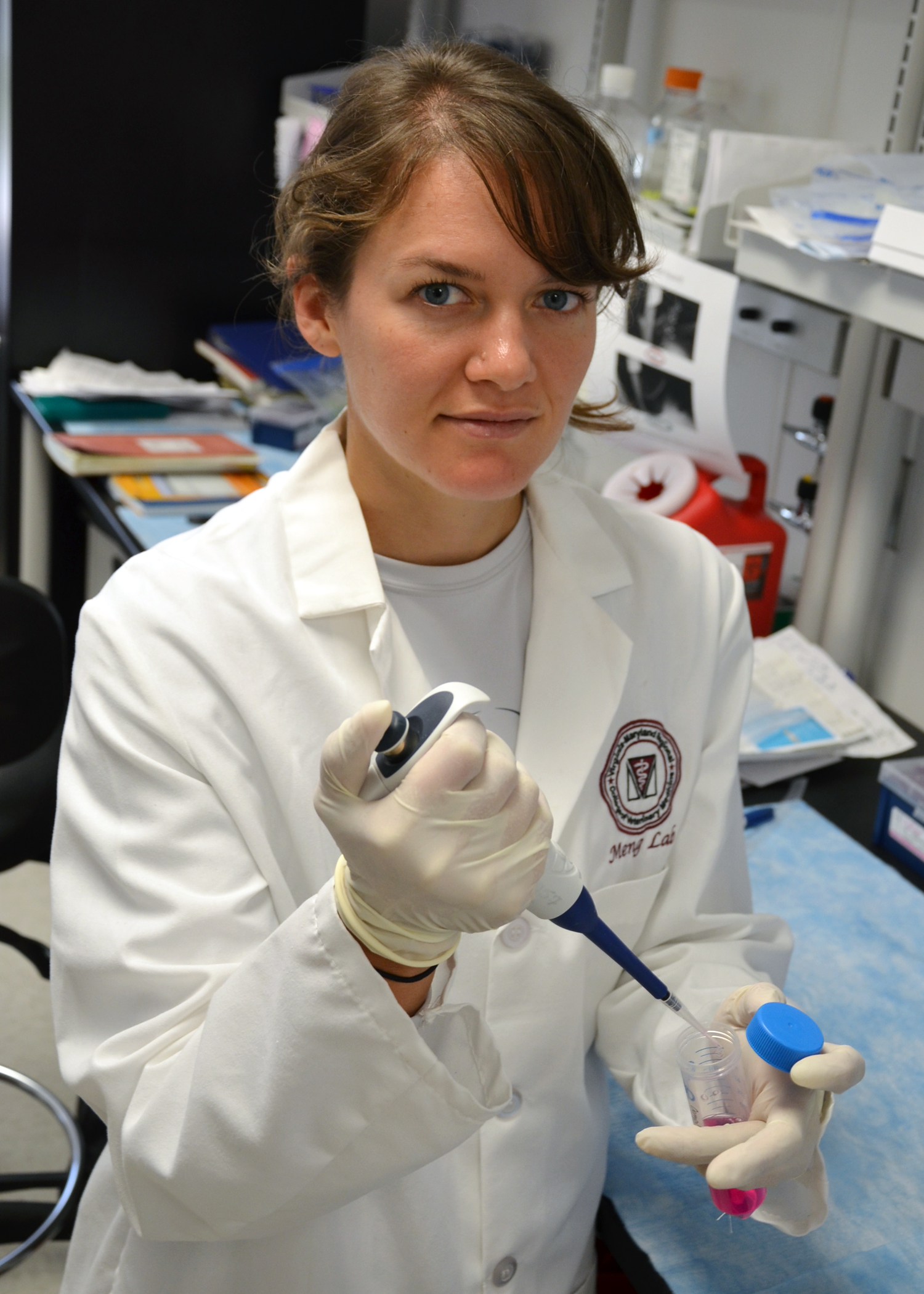Veterinary researcher focuses on swine disease with U.S. Department of Agriculture postdoctoral fellowship

A researcher in the Virginia-Maryland Regional College of Veterinary Medicine seeks to better understand the cause of a global swine disease that has caused significant economic losses since its first discovery in the late 1990s.
Shannon Matzinger, postdoctoral associate in the college’s Department of Biomedical Sciences and Pathobiology, received a two-year, $150,000 postdoctoral fellowship grant from the U.S. Department of Agriculture to investigate how porcine circovirus type 2 (PCV2) depletes the lymphatic system and causes inflammation in pigs.
“Although this is arguably one of the most economically important pig viruses, we still do not fully understand the mechanism for how it causes disease,” Matzinger said. “If we can identify the underlying mechanism that causes the disease, we can design better control and prevention strategies against the virus.”
Scientists first identified non-pathogenic porcine circoviruses in contaminated kidney cells in 1974 and the pathogenic strain in pigs with post-weaning multi-systemic wasting disease in 1998. The disease can cause respiratory issues, intestinal disease, and reproductive problems and primarily infects the lymphatic system.
Dr. X.J. Meng, University Distinguished Professor of Molecular Virology and Matzinger’s mentor for this fellowship grant, explained that although vaccines against the virus have been on the market since 2006, emerging variant strains of the virus and rare cases of vaccine failures still threaten the swine industry. He and Matzinger say they hope to identify some of the genetic factors in the host cells and the virus genome that may be wreaking havoc on the immune system of infected pigs.
“One of the questions that remain unanswered is how porcine circovirus type 2 is depleting the immune system,” Matzinger said. “If we can answer this question, we will understand a key component of the viral pathogenesis and disease progression.”
In particular, the Menlo Park, Calif., native will be testing a hypothesis that the virus encodes viral micro-RNAs — molecules that play an important role in the regulation and expression of genes — that obstruct the immune system’s ability to detect the virus either by maintaining low levels of virus replication or preventing specific cells in the immune system from communicating with each other.
A part of the U.S. Department of Agriculture’s National Institute of Food and Agriculture Fellowships Grant Program, the prestigious postdoctoral fellowship support’s Matzinger’s long-term goal to pursue an academic career focusing on host-pathogen interactions and the development of interventions against animal viral diseases. Matzinger previously earned her Ph.D. from the University of California Davis’s Center for Comparative Medicine, where she studied the role of host immunity in controlling influenza virus replication.
Meng’s lab studies the molecular mechanisms of viral replication and pathogenesis and develops vaccines against emerging, reemerging, and zoonotic viral diseases. In 2006, the lab invented the first USDA fully licensed vaccine against PCV2 and its associated post-weaning multi-systemic wasting syndrome in pigs, which is now commercially available worldwide.
Earlier this year, the lab received a $1.6 million grant to study cross-species infection of hepatitis E virus and a $2 million grant to investigate chronic infections of hepatitis E virus, both from the National Institutes of Health. It received another $500,000 grant from U.S. Department of Agriculture to identify protective T-cell epitopes against porcine reproductive and respiratory syndrome virus. Meng and his colleagues also recently tracked the origin of the U.S. strains of emergent porcine epidemic diarrhea virus.
Written by Michael Sutphin.
Related Links
- Veterinary scientists track the origin of a deadly emerging pig virus in the United States
- National Institutes of Health grant lets veterinary college's X.J. Meng study how hepatitis E virus infects across species barrier
- Veterinary college's X.J. Meng honored as University Distinguished Professor
- Veterinary college's X.J. Meng awarded nearly $2 million to study chronic hepatitis E




